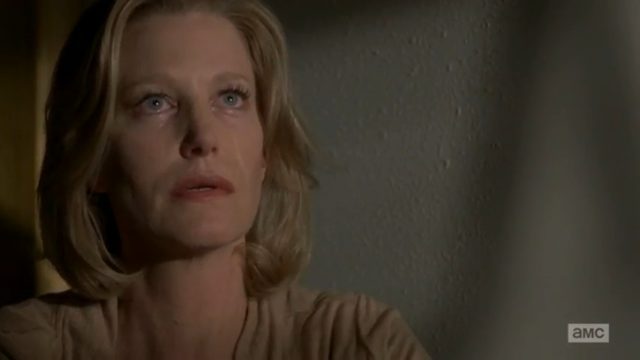SPOILERS for the final episode of Breaking Bad.
*
*
*
The final episode of Breaking Bad has a scene in which protagonist Walter White stands before his wife Skyler and tells her that everything he did in the series was for himself. The scene is dramatically unnecessary; nothing forced Walt into it, and no consequences come of it (the first part is true of the whole episode). Skyler has been one of Walt’s main victims, subject to his emotional abuse and forced into playing a major role in his illusion of suburban normality. She’s also the one who most often hears his justification for creating a meth empire: to provide for his family. He has insisted on this long after she and the viewer have figured out that he’s really fulfilling a lust for power. His confession to Skyler is the very first time he’s ever admitted his true intentions to anyone, even himself. Regardless of any individual’s opinion of the finale, this scene has taken on an iconic status in part because of the emotional power of the scene; beloved commentor and occasional Solute contributor scb0212 described it as a weight coming off the soul. Why does it have that effect?
At the simplest level, it’s a musical effect; we’ve been hitting the same chord for so long that it’s a relief to shift off it. There’s also something satisfying in seeing the truth be uncovered; one human need is to see someone who feels the same as you, and one read of Breaking Bad is that it denies the validation of your emotion right up until the maximum payoff. We’ve all known a giant tool and wished they could just admit they’re a giant tool; Breaking Bad delivers that kind of satisfaction at its most intense. But it goes even further than that; it goes into the very spirituality of the show. Breaking Bad is a show that believes in Good and Evil as something that can actually be measured and quantified, as if every one of Walt’s actions adds another ten nanohitlers onto his Evilness; it believes in God as someone who actively responds to the actions of the characters, warning characters off their path to the point of dropping planes on them.
By the point of finale, Walt has committed enough Evil that he is absolutely going to Hell when he dies – that isn’t my interpretation of events, that’s what Vince Gilligan has said in interviews. He’s past the point where he can believably redeem himself in the eyes of the story. The only Good thing he can do is correctly align his feelings, to feel how the story wants him to feel; his confession isn’t enough to stop him dying or going to Hell, but it is enough for the story to allow him to undo some of the damage he’s inflicted. The weight lifted is the threat that Walt is 100% Evil. There’s still a part of him that ‘correctly’ tells Good from Evil. Morality has been restored, not just for the story, but for Walt.


